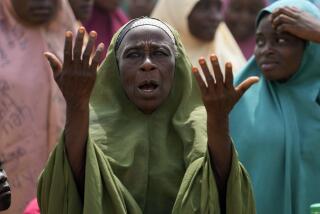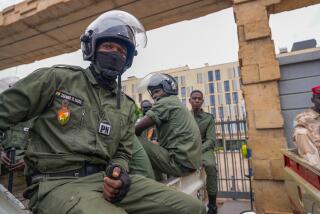Nigeria Defends Its Rights Record : Africa: Under pressure from the West, foreign minister denies political jailings and holds out hope for democracy.
- Share via
JOHANNESBURG, South Africa — To hear Nigeria’s top officials tell it, President Clinton and other concerned Western leaders need not worry about gross human rights abuses and jailing of political prisoners by the military clique that controls Africa’s most populous nation.
“No one is held in Nigeria for his political views,” Foreign Minister Tom Ikimi told reporters here Thursday. “No one is held because he is a journalist or because of his writing.”
Ikimi said it is impossible for Gen. Sani Abacha’s military regime to hold political prisoners since, as he explained, “There is no political opposition in the country at this time. There are no political parties.”
So went an unusual attempt at damage control by Nigeria’s increasingly beleaguered rulers. A delegation here, led by Ikimi, spent the week desperately trying to convince visiting African leaders, Western ambassadors, academics and the media that Nigeria is not ruled by what many have called an oppressive regime.
“I hope you know that our country is not a cave, is not a primitive place,” Ikimi said.
In meeting after meeting, the Nigerians held out a recent promise by Abacha to announce democratic reforms Oct. 1 and to begin a transition to civilian government.
Abacha has said he is studying a report by a constitutional conference suggesting that the presidency should rotate among rival groups in the north and south to ease fierce regional and ethnic tensions. But no timetable was recommended, and diplomats say Abacha has failed to deliver on previous pledges of reform.
Even Ikimi appeared doubtful. As he put it Thursday, Abacha “will perhaps, by the grace of God, finally remove the military from politics” and allow multi-party democracy and civil liberties in one of Africa’s most troubled countries.
But Ibrahim A. Gambari, Nigeria’s ambassador to the United Nations, seemed perplexed by the international criticism and concern. “What is the basis of the hostility toward Nigeria?” he asked. “Regimes come and go in Nigeria.”
Military dictatorships have run Nigeria for 25 of the 35 years since the oil-rich West African nation won independence from Britain in 1960. The latest group of generals seized power in November, 1993, after the annulment of a national election that independent observers said had selected opposition leader Moshood K. O. Abiola as president.
The U.S. State Department and other critics say Abacha’s regime has ruthlessly crushed trade unions, imprisoned opposition leaders and journalists, conducted systematic human rights abuses and condoned and profited from heroin trafficking to the United States and Europe.
Abacha also has dissolved the national legislature as well as state and local governments. Human rights groups say that the judicial system has largely collapsed, arbitrary arrests and mass executions are widespread and medical and other social services have deteriorated sharply.
“These rumors . . . 99% of them are not true,” Kaloma Ali, minister of solid mineral development, complained at the news briefing Thursday. He singled out Nobel literature laureate Wole Soyinka, now in exile in America, for spreading what he characterized as disinformation.
*
International concerns mounted in July when a secret military tribunal convicted Abiola and at least 39 others of conspiring to overthrow the regime.
Among those convicted was Olusegun Obasanjo, who in 1979 became Nigeria’s first and only military ruler to voluntarily relinquish power to civilians. Since then, he has spoken out against corruption and repression in his country.
Although diplomats say the coup charges were trumped up, and no evidence was released from the secret trials, the court-martial judges reportedly recommended the death penalty for 14 members of the group.
This year, a parade of foreign dignitaries, from former President Jimmy Carter to Desmond Tutu--South Africa’s Anglican archbishop and Nobel peace laureate--have visited Lagos to plead unsuccessfully for their release.
Clinton also has written and telephoned Abacha to warn him against executing any of the alleged coup plotters. The President has warned that the United States will neither remove Nigeria from its list of drug trafficking states nor let its national airline resume lucrative U.S. service if any prisoner is executed.
Donald F. McHenry, Clinton’s special emissary to Nigeria and a former U.S. ambassador to the United Nations, is expected to deliver the blunt message in person this weekend when he makes his seventh visit to Lagos since December.
*
American human rights activists also have begun targeting Nigeria. On Wednesday, 14 protesters were arrested outside Nigeria’s Embassy in Washington. Among them was Randall Robinson, founder of the lobbying group TransAfrica.
TransAfrica has announced a campaign against the Abacha regime similar to its high-profile efforts to impose sanctions against the former apartheid regime in South Africa. The group has demanded a U.S. oil embargo against Nigeria until democracy is restored.
Nigeria provides an estimated 12% of American oil imports and is the fourth-largest producer in OPEC, the Organization of Petroleum Exporting Countries.
But Ikimi, the foreign minister and a close adviser to Abacha, said the growing international pressure and isolation played no part in his current lobbying effort.
“We’re not reacting because we’re afraid of America,” he said. “We believe in democracy. That is fundamental. The people want a democratic-style government, including the military.”
Nigeria’s rulers also face growing economic pressure--the country owes $37 billion to foreign creditors. Last year the economy was at its worst in a decade.
Endemic corruption and mismanagement have left the nearly 100 million people in one of Africa’s most resource-rich countries among the poorest in the world.
Annual per capita income is similar to that of Haiti.
Ikimi downplayed the problems, however. “We have our own little problems in Nigeria at this time,” he said.
More to Read
Sign up for Essential California
The most important California stories and recommendations in your inbox every morning.
You may occasionally receive promotional content from the Los Angeles Times.














